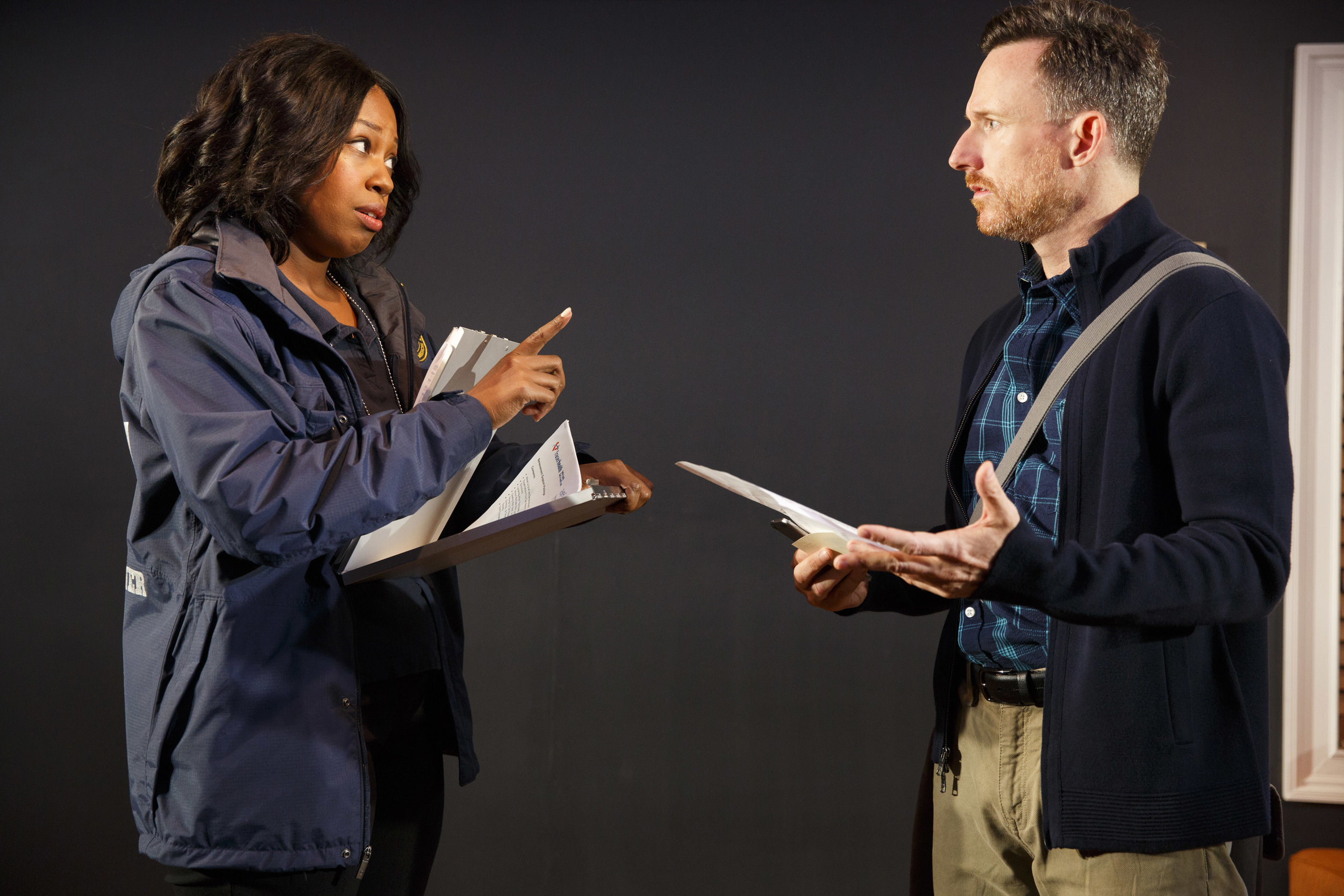Adam Bock’s rueful A Life covers both the title and its aftermath. It may borrow from—or perhaps merely echo—other plays, but in 80 minutes Bock conveys the fragility of mortality and the sadness of one person’s death in a deeply affecting way. Structurally, A Life is unusual. It begins with a long monologue, as David Hyde Pierce’s Nate, a middle-aged gay man, talks about his life, his ex-boyfriends, and his interest in astrology. The monologue lasts half an hour, and it may recall the tour de force that opens Tony Kushner’s Homebody/Kabul, although this monologue dovetails more organically into what follows.
Bock’s theme is virtually identical to that of A Delicate Ship (yet the result is more powerful), the Anna Ziegler drama staged by Playwrights Realm last season at Playwrights Horizons. That took its title from W.H. Auden’s poem Musée des Beaux Arts, as the Greek figure of Icarus falls from the sky into the ocean:
“The expensive delicate ship, that must have seen Something amazing, a boy falling out of the sky, Had somewhere to get to, and sailed calmly on."
The point of Auden’s poem is Bock’s too: no matter the gravity of one person’s death, life continues in its myriad small ways, even though they pale next to the end of an existence. In the half-hour opener, Hyde Pierce is able to connect deftly to his audience with the details of Nate’s past. Obviously famous from his work on television, Hyde Pierce is a consummately skilled stage actor as well. He has a wry comic delivery, sometimes self-deprecating, sometimes bewildered, accompanied by nods of the head, hangdog eyes, pauses, repetitions and grimaces, as he relates his early life in Pawtucket, R.I.; his friendship there with a woman who got him interested in astrology; and the string of boyfriends that he has had, many of whose names rhymed: Sean, John, Ron, Johan, Jan. Every moment feels lived in and true.
Hyde Pierce’s casual yet powerful performance ensures that we come to care about Nate before his life-ending event. (Alas, it’s impossible to discuss this play without this spoiler.) Some of his friends, he says, wonder why he never paired up with Curtis (Brad Heberlee), his longtime best friend, but it’s not in the cards, Nate says. Their bond is conveyed in a lovely scene as the two friends sit on a New York City park bench and watch muscular men jog by, trading amusing expressions of admiration and frustration.
As Nate returns home, he suffers a heart attack. What follows under Anne Kauffman’s superb direction is another extraordinary bit of stagecraft. For perhaps four minutes—an eternity in stage time—nothing moves and one hears only Mikhail Fiksel’s urban soundscape outside and registers the subtle lighting by Matt Frey that indicates the passage of time.
Two scenes then pick up the thread of Bock and Auden’s theme more directly. The mortician’s office arrives to collect Nate’s body while the stricken Curtis stands by, a bit bewildered as the mortician, Jocelyn (Marinda Anderson), takes a call on her cell phone. It seems inappropriate, but it’s also true: other lives continue in all their small, messy ways even as one life ends. There are even comic moments amid the tragedy, as Jocelyn persistently mishears the phone number Curtis is trying to give her, and they go back and forth trying to get it right.
In the following scene the drama literally stops, as it does in D.H. Lawrence’s The Daughter-in-Law after the husband comes home from the mines and washes up, drawing its power from the simplicity of action. On a gurney in the funeral home, Nate’s body is prepared, as Jocelyn and her assistant comb the hair, cut the nails, and glue the lips shut—while discussing family flare-ups and inconsequential bits of botany and biology. The effect is to set in relief, amid the mundane babble, the gravity of a life lost.
Bock’s final scenes follow Nate’s funeral, Curtis’s breakdown (Heberlee’s part isn’t flashy, but he inhabits it feelingly), a speech by Nate’s sister (Lynne McCollough, who is equally good as a mousy mortician’s assistant), and a voice-over (there have been some already) from Nate. The voice-over carries the promise of something beyond. It’s a graceful and powerful ending to a simple story, brilliantly staged and presented.
Playwrights Horizons (416 West 42nd St. between Ninth and Tenth avenues) is presenting Adam Bock's A Life through Dec 4. Evening performances are at 7:30 p.m. Tuesdays through Saturdays and at 7 p.m. on Sundays. Matinees are at 2:30 p.m. Saturday and Sunday. During Thanksgiving week (Nov. 21-27), the performance schedule will be Monday, Tuesday, Friday and Saturday at 7:30 p.m., and Wednesday, Saturday and Sunday at 2:30 p.m. Tickets are $59-$99 and may be purchased by phone at (212) 279-4200 or by visiting phnyc.org.









